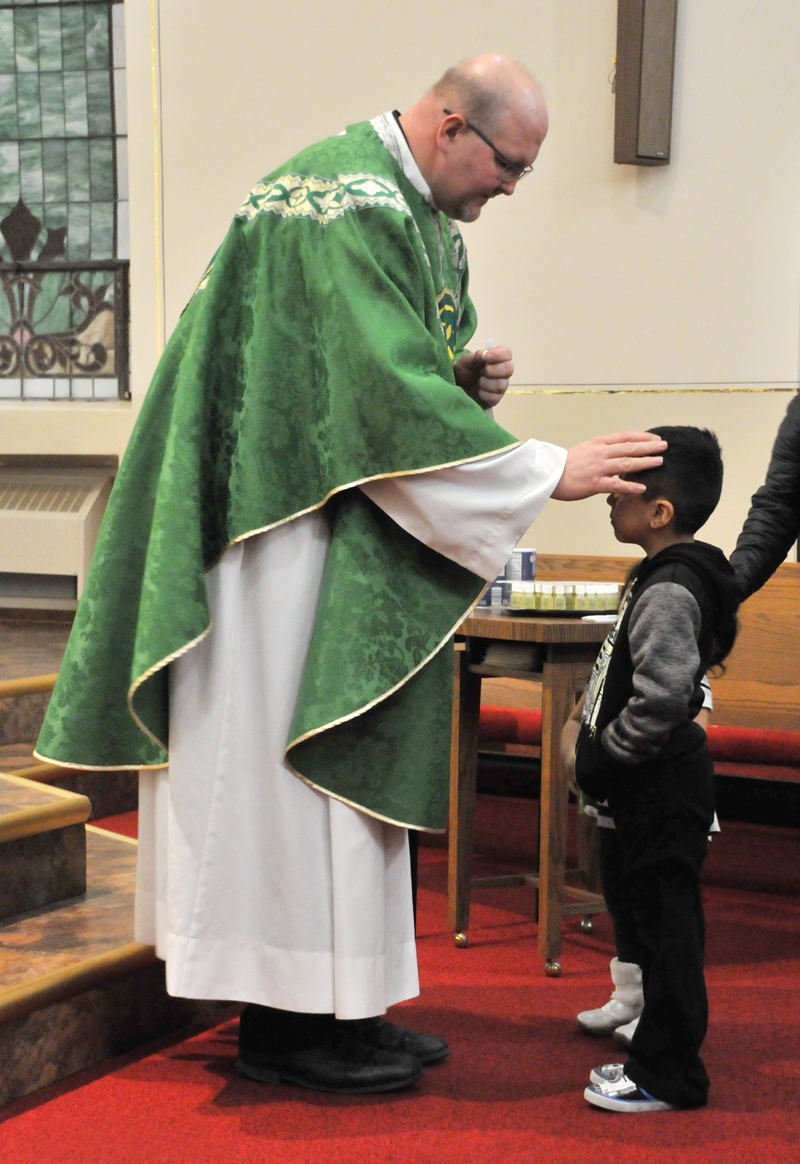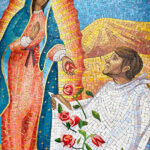By Fr. Joe DeFrancisco
The story of Genesis, Chapter 3, reveals to humanity that one consequence of Adam and Eve’s fall and exile from God’s life-giving garden is that future descendants will have to suffer pain, sickness, suffering and death. Having spent decades of ministering to the sick, the elderly and dying, I have often heard a defiant kind of prayer: “Why has God robbed me of my health, or stolen my life?”

Father Troy Richmond blesses a boy at a Mass for healing in February.
It is often the case that we are caught off guard, even with all our best preventative medical actions. Losing one’s good health, or being told that we have an incurable illness, quite reasonably moves us to ask God for his reasons: “Why me?” These kinds of questions are likewise accompanied by a myriad of emotions. On the one hand, our human condition may express fear, frustration, anger, depression, despair, abandonment, hopelessness, rejection, defiance. On a more optimistic side, we may accept and surrender our fate with feelings of trust, faith, hope, understanding or statements such as, “This is how God is asking me to accept my cross.”
The revelation of God’s Word in the New Testament offers a much more hopeful and positive response to the Genesis plight. Jesus shares a moving and beautiful sermon on his mission as “the” model of a Good Shepherd. He does not deny that there are natural forces at work which cause pain and suffering. In the Gospel of John, Jesus acknowledges that the forces that weaken, debilitate, even destroy the well-being of humanity are like “thieves” in the night. They come to “steal,” “slaughter” and “destroy.” (John 10:10)
Nevertheless, Jesus assures his hearers that God the Father has sent him and given him the mission to counteract the forces that “rob us” of health and life: “I have come that you may have life and life to the fullest … It is for these sheep that I will give my life.” (John 10:16).
When the religious leaders criticized Jesus for “eating with sinners,” he offered this response: “People who are well do not need a doctor, but sick people do. I have come to invite and call sinners to health.” (Mark 2:17) The Latin word for health is “salutem.” The English derivative of this word may also mean “salvation.” In Jesus’ teaching they are one and the same. The Father, through Jesus, has invited all men and women to be saved. This journey to salvation is not about sickness and death but about life and wholeness. Most of us who will endure the innate weakness of our human condition through sickness, aging, suffering and death, are invited to turn to Jesus, as “Divine Physician” who desires our full and total health.
In reading the many stories of healings, cures, release from demonic possession, etc., it is clear that Jesus understood his mission as pro-actively reaching out to the “Lost Sheep,” those in need of forgiveness, mercy-compassion, healing, cures and, in the case of Lazarus, a foretaste of resurrected life. Early in the experience of the early Christian community the apostle James, Patriarch of the Jerusalem community, gives this critical pastoral directive: “For those who are suffering among you, pray. If your suffering and hardship finds you in good spirits, then your prayer will praise God. If you are sick, then call for the presbyters. They will pray over you and anoint you in the name of Jesus. Their prayer uttered in faith will reclaim you from your sickness. If your ailment is your sin, then God’s forgiveness will be ministered to you. Pray for one another that you may all find healing.”(James 5:13-17)
A great deal of emphasis in the Lucan narrative focuses on physical, mental and spiritual healing. As a consequence, when Jesus sends out an additional 72 disciples, he assures them that they also will have the power to forgive, heal, reconcile and cure. Jesus adds a word of warning: “your prayer must be grounded in faith. In the General Instructions on how to “implement” the Constitution on the Sacred Liturgy, the ministry of anointing and healing is to be considered “a special sign of our union to Christ in His suffering and Resurrection.”
The sacrament of anointing is to be ministered as frequently as necessary, with special emphasis on the importance of reconciliation and Eucharist. Clearly, the tradition of the sacramental life in the church demonstrates an inseparable bond between the resurrected Christ and his incarnate presence through ministry of sacrament and the healing power within these sacraments, particularly penance, Eucharist, and anointing. While the Acts of the Apostles 3:1-13 reveals the importance and nature of healing ministry, the 2006 document published by the U.S. Catholics bishops in their efforts to counsel and guide those ministering to individuals suffering from the AIDS crisis summarized quite effectively the theological nature of sickness and our pastoral response.
Like the weak, sinful and suffering souls who were drawn to Jesus, so in our present day many will seek out our Catholic faith communities in a hope that we will “affirm” their human dignity and respond to their suffering condition. The bishops remind us that our brothers and sisters enduring multiple forms of human weakness and suffering are also seeking wholeness and holiness. They charge us to welcome the weak, sinful and infirm through love and a true expression of our faith.
Our faith communities must offer the ailing both corporeal and spiritual support, for as members of the one body of Christ, they have “special” needs. As we approach celebrating the events and memory of Jesus’ own horrific suffering and death, we are reminded that Jesus expects us to do our part in ministering mercy, compassion, love and the limitless forms and expressions of healing to the broken souls among us. “It is truly your Heavenly Father’s Will that not a single one of these little ones shall ever come to grief.” ( Matt. 18:14)
(Fr. Joseph DeFrancisco, S.T.D., is a professor of theology and pastoral studies at St. Ambrose University in Davenport.)











